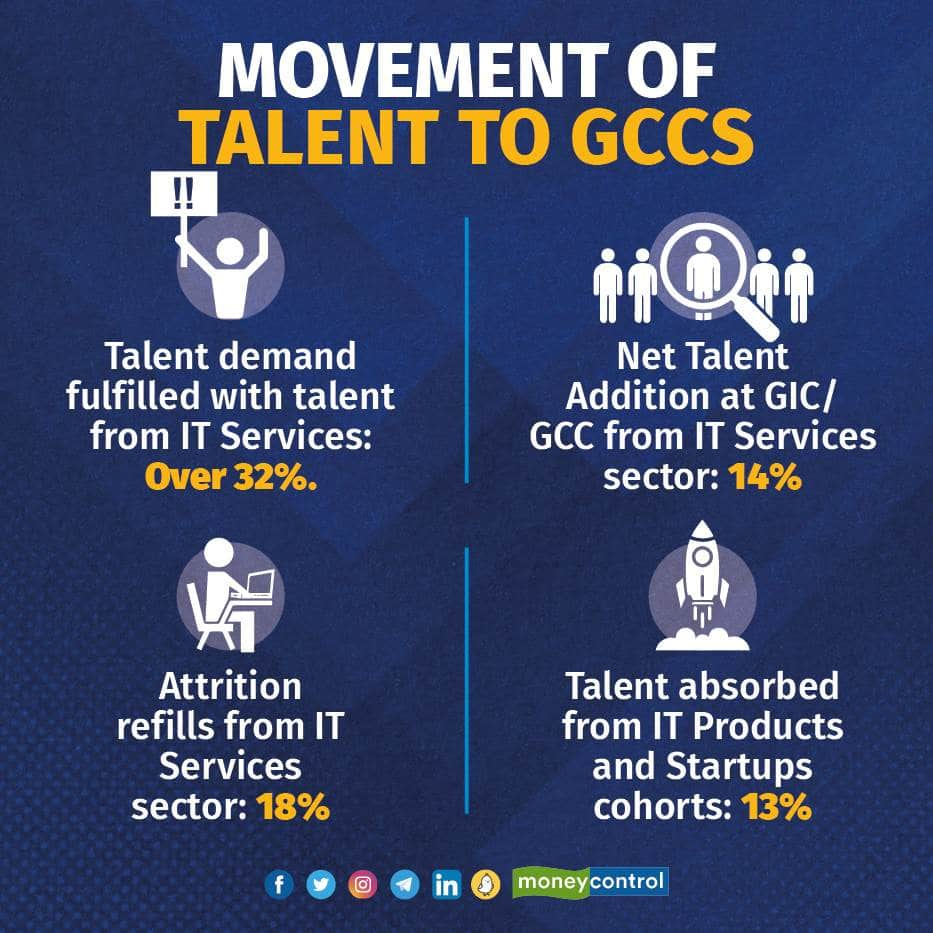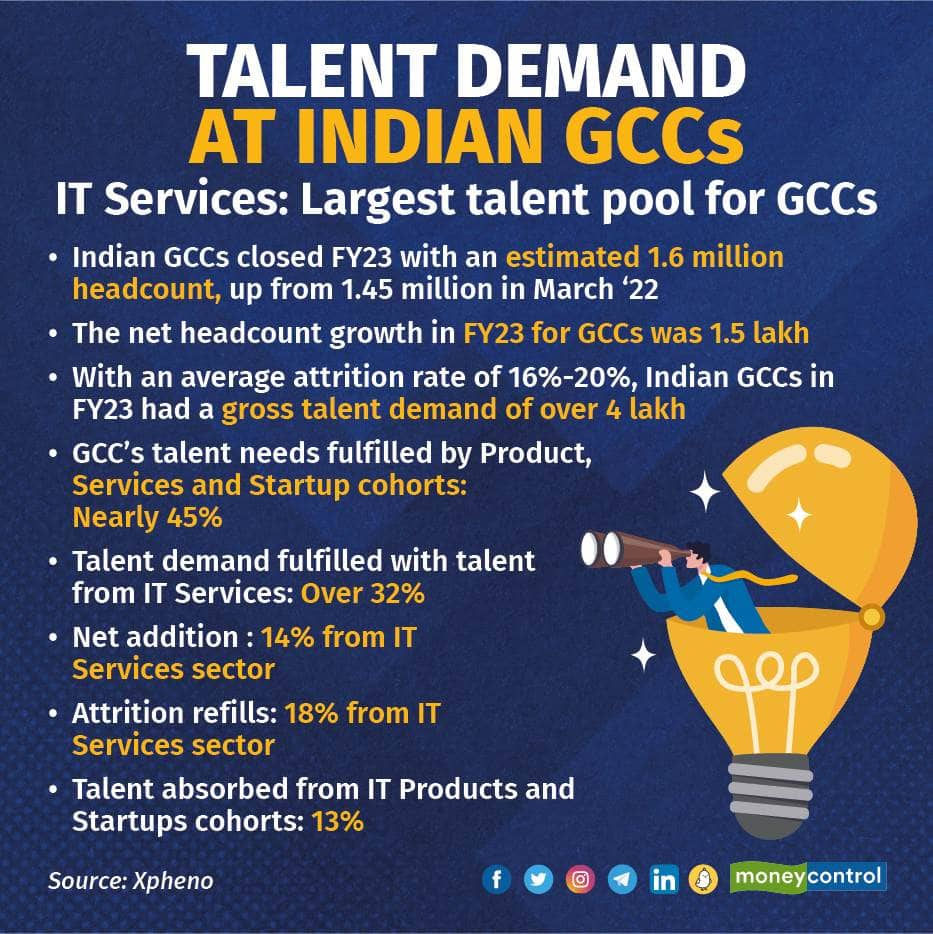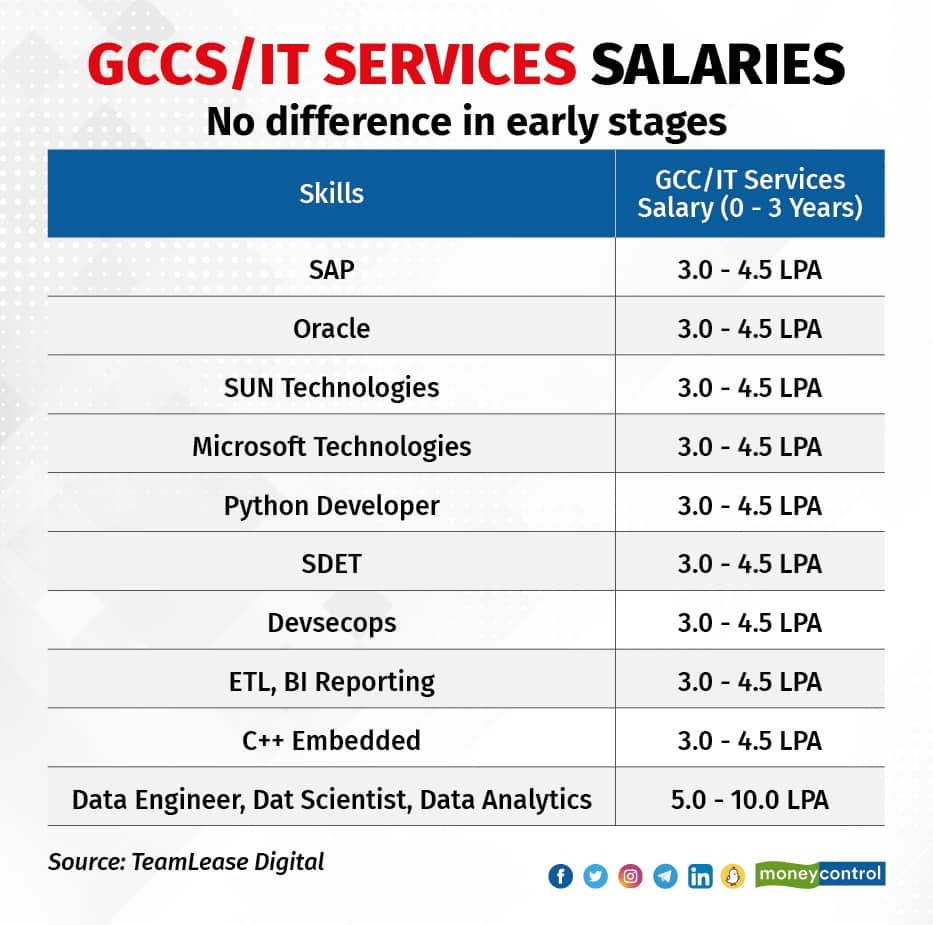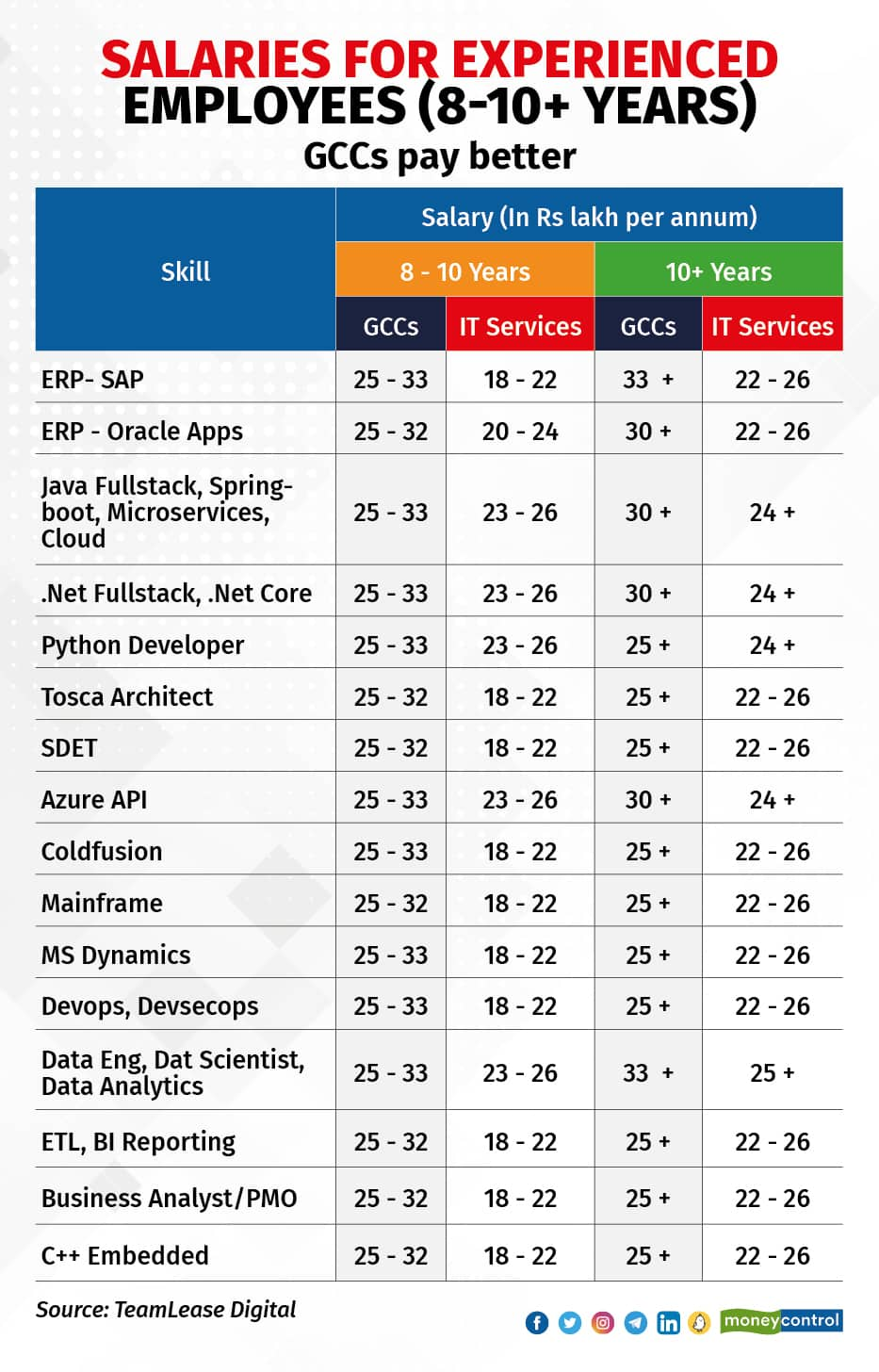



Global capability centres (GCCs), or captives as they are more commonly known, are growing at a rapid clip, quite in contrast to the slowdown in IT services, which is expected to continue until at least the second half of this financial year.
IT companies may be among the largest recruiters, but as their net addition slows significantly, GCCs may be snapping up some of the talent and be on the lookout for more.
The switch to GCCs also comes as they evolve from offering back-office and support functions to centres of product and business ownership. This gives employees with three to 12 years of experience a step up and an opportunity to work for international organisations from India. Mature GCCs have also started to hire freshers.
Over 1.6 million professionals are employed by 1,580-plus GCCs in India, according to a report by Nasscom, the apex body for tech companies, and Zinnov, an advisory firm.
Read: How GCCs in India are giving IT services companies a run for their moneySo far, tech talent in India had three options – IT service companies, domestic startups, and GCCs, said Vikram Ahuja, managing director of ANSR, which provides enterprise talent and helps organisations set up captives in India. Ahuja said for young professionals, it is an opportunity to work for some of the best companies in the world sitting in India.
Brand recallIT service companies have been big brand names for aspiring graduates, given their recognition and recall and the perception of a safe and secure job.
According to Kamal Karanth, cofounder of specialist staffing company Xpheno, job seekers choose where to work depending on the brand, role, industry, money, and sometimes, the people factor.
“Early in their careers, many software engineers who aspire to work for IT service companies like Infosys or Wipro end up working at non-tech companies like PSUs or banks. When they get into such companies, they serve large brands like Walmart and JPMorgan, which then creates an appeal for them,” he said.
Talent platform foundit (formerly Monster) CEO Sekhar Garisa concurs and said that if a company is setting up a captive in India, it is already of a certain size, scale, and stature.
“Who's to say that the IT service companies are not working for the same parent company of the GCC? People will start looking at it a lot more positively because GCCs these days are no longer doing the low-end, back-end work,” he said, adding that work segregation between the parent location and the GCC is not dependent on the quality of work anymore, but competencies.
The quality of work should “definitely incentivise” more talent to look at GCCs as an option that’s as good as any of the top IT service companies, he added.
The shiftThe switch from IT firms to GCCs may have already begun, although on a smaller scale, but it indicates what the future trend may look like.
An April 2023 report from Quess IT Staffing revealed that 20 percent of the lateral movement from IT firms was absorbed by GCCs and non-tech companies that are going digital. This comes as IT companies aren’t filling all vacancies caused by attrition, the premium paid during the ‘War for Talent’ has gone down, and layoffs by startups have topped over 6,000 in the first five months of this year.
According to a report by Xpheno, the movement from IT firms to GCCs may even be higher at 32 percent. The staffing firm, which conducted a dipstick study of talent movement at 80 GCCs across eight industry sectors over one year, found that 14 percent of the net addition at GCCs was from the IT services sector, and so was 18 percent of attrition refilling.
“In all, a collective of over 32 percent of the talent demand of the GCCs was fulfilled with talent absorbed from IT services,” it said.


It’s not just IT service companies that GCCs are attracting talent from, but also product companies and startups. The report revealed that close to 45 percent of a GCC’s talent needs came from services, products and startups.
The drawANSR’s Ahuja said their candidate-side surveys showed that people look for three things from their next employer — career growth and learning, culture and flexibility, and compensation and benefits.
“GCCs are quickly emerging as an extremely attractive place to get a lot of learning upfront. You're working for global companies, with colleagues from around the world, getting to do great work, because all of these global capability centres are essentially dabbling in some sort of new tech,” he said.
He added that they also offer work-life balance and employees are well taken care of in terms of compensation and benefits.
“From a job security and safety standpoint, a lot of people have started looking away from startups, even though the learning opportunities are phenomenal. We’re seeing that GCCs have started to attract a lot of talent today that views it as a balanced growth opportunity versus some of the other options. There's definitely been a lot more interest and demand for these kinds of roles in the last 18 to 24 months,” Ahuja said.
Xpheno’s Karanth added that as international brands, GCCs rank higher than Indian IT service companies among tech talent.
For those whose circumstances may prevent them from going abroad to work onsite, Karanth said they may move to GCCs far more easily. Onsite opportunities are higher in IT services companies, but they too may be impacted due to the current market and visa regulations.
Experts said GCCs may be more flexible in their policies and more amenable to demands such as remote working.
The clincherKaranth said that IT services being mass-hirers are names that are familiar with institutes, the immediate neighbourhood of a graduate, and professionals know them as well. Where the tide may really be turning is the compensation packages of GCCs.
Data from TeamLease Digital revealed that while salaries are not very different for graduates (0-3 years of experience), they tend to diverge dramatically from IT services beyond this level — especially as it is said that the competencies GCCs require are higher.

The reason for this, according to TeamLease Digital’s business head for captives Krishna Vij, is that entry-level positions “typically emphasise foundational skills and competencies, leading to standardised compensation levels across the industry.”
However, she added that GCCs provide competitive salaries, clubbed with attractive employment benefits, to attract highly skilled professionals. On average, the salary offered by a GCC and an IT service company varies by about 30 percent for highly sought-after skills.


Niche skills are where IT services and GCCs go neck and neck while competing for talent, with scarce availability narrowing the salary gap.
“Professionals with expertise in emerging technologies such as artificial intelligence, data science, machine learning, and cybersecurity may receive higher compensation compared to those with more common or generic skills,” said Vij.

Both Garisa and Ahuja said that professionals slightly further along in their career with a longer-term view are focussing more on better employee policies and safer jobs (from startups in their current condition), and are careful about where they choose to work.
If the trend in IT hiring continues and onsite opportunities shrink, Garisa said there will be an increase in the number of employees moving to GCCs from IT.
“In a recession, the onsite opportunities in the IT service companies go down, which is something the laterals are really keen on. Also, better companies start looking at a greater pie of the action from GCCs from a cost consideration perspective. People also start looking at more roles, better employee policies, safer jobs. When all of these factors are there, which are tailwinds for growth in GCCs, you would expect that this number is only likely to go up as long as the current economic scenario continues,” he said.
Discover the latest Business News, Sensex, and Nifty updates. Obtain Personal Finance insights, tax queries, and expert opinions on Moneycontrol or download the Moneycontrol App to stay updated!
Find the best of Al News in one place, specially curated for you every weekend.
Stay on top of the latest tech trends and biggest startup news.